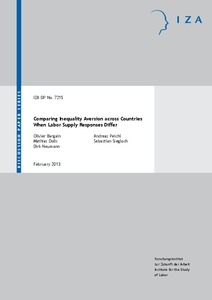Comparing inequality aversion across countries when labor supply responses differ

Bargain, Olivier ; Dolls, Mathias ; Neumann, Dirk ; Peichl, Andreas ; Siegloch, Sebastian
Institute of Labor Economics, Bonn
IZA - Bonn
2013
1 v.
income tax ; labour supply ; social assistance ; statistics ; social inequality
Discussion Paper
7215
Income distribution
English
Bibliogr.
"We analyze to which extent social inequality aversion differs across nations when control- ling for actual country differences in labor supply responses. Towards this aim, we estimate labor supply elasticities at both extensive and intensive margins for 17 EU countries and the US. Using the same data, inequality aversion is measured as the degree of redistribution implicit in current tax-benefit systems, when these systems are deemed optimal. We find relatively small differences in labor supply elasticities across countries. However, this changes the cross-country ranking in inequality aversion compared to scenarios following the standard approach of using uniform elasticities. Differences n redistributive views are significant between three groups of nations. Labor supply responses are systematically larger at the extensive margin and often larger for the lowest earnings groups, exacerbating the implicit Rawlsian views for countries with traditional social assistance programs. Given the possibility that labor supply responsiveness was underestimated at the time these programs were implemented, we show that such wrong perceptions would lead to less pronounced and much more similar levels of inequality aversion."
Digital
The ETUI is co-funded by the European Union. Views and opinions expressed are however those of the author(s) only and do not necessarily reflect those of the European Union or the ETUI.